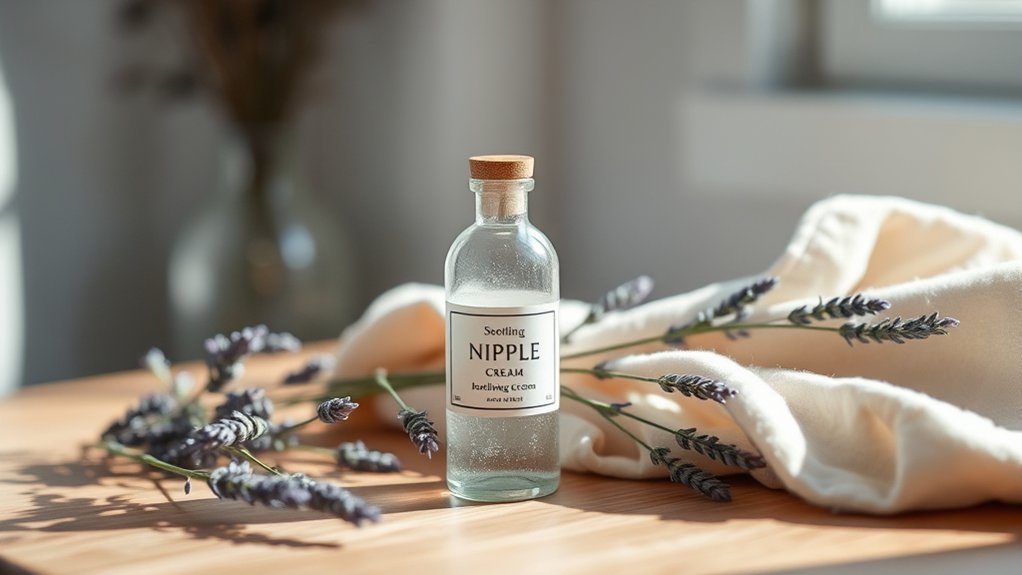Did you know that nearly 80% of breastfeeding women experience nipple pain at some point? This common issue can stem from various causes, and understanding how to manage it is key. From effective remedies to understanding hormonal influences, it’s vital to know your options. But when should you be concerned enough to seek medical advice? Let’s explore the solutions and preventive measures that can help ease your discomfort.
Common Causes of Nipple Pain
Nipple pain can arise from various causes, and understanding them is vital for effective relief.
One common cause is friction, often due to ill-fitting bras or excessive movement during physical activity. Skin conditions like eczema or dermatitis can also lead to irritation and discomfort.
Friction from ill-fitting bras or vigorous activity, along with skin conditions like eczema, can lead to nipple irritation and discomfort.
Infections, such as mastitis or thrush, may result in sharp or throbbing pain. Hormonal changes, especially during menstruation or pregnancy, can make your nipples sensitive.
Additionally, breastfeeding can create soreness from improper latching or overuse.
Finally, certain medical conditions, like Paget’s disease, can cause unusual nipple pain. Identifying the root cause is essential for addressing the issue effectively and finding the right solution for your comfort.
Remedies for Breastfeeding-Related Discomfort
Breastfeeding can sometimes lead to discomfort, but several remedies can help alleviate this pain. Here are some effective solutions you can try:
- Apply a soothing ointment: Use lanolin or a natural oil to moisturize your nipples.
- Practice proper latch: Verify your baby is latching correctly to minimize friction.
- Take breaks: Alternate feeding positions and give your nipples time to rest.
- Use cold compresses: Apply a cool cloth to your nipples after feeding to reduce swelling and discomfort.
- Stay hydrated: Drink plenty of fluids to maintain overall breast health.
Implementing these remedies can make breastfeeding more comfortable and enjoyable for both you and your baby.
Don’t hesitate to consult a lactation consultant if discomfort persists.
Hormonal Influences on Nipple Sensitivity
Hormonal fluctuations during various life stages can considerably affect nipple sensitivity. These changes can lead to increased sensitivity or discomfort, often linked to hormonal levels, such as estrogen and progesterone. Here’s a breakdown of how different stages can influence your experience:
| Life Stage | Hormonal Changes | Nipple Sensitivity Effects |
|---|---|---|
| Menstrual Cycle | Estrogen rises, then falls | Increased sensitivity pre-menstruation |
| Pregnancy | Elevated estrogen & progesterone | Heightened sensitivity and tenderness |
| Postpartum | Hormonal adjustments | Variability in sensitivity |
| Menopause | Decreased estrogen | Reduced sensitivity, potential discomfort |
| Hormonal Therapy | Supplementation of hormones | Changes in sensitivity based on therapy type |
Understanding these influences can help you manage nipple sensitivity throughout different phases of life.
When to Seek Medical Attention
When should you consider seeking medical attention for nipple pain? It’s important to listen to your body.
If you experience any of the following symptoms, don’t hesitate to consult a healthcare professional:
- Persistent pain lasting more than a few days
- Pain accompanied by a noticeable lump or mass
- Discharge from the nipple that’s bloody or foul-smelling
- Skin changes, such as redness, swelling, or dimpling
- Pain associated with fever or other systemic symptoms
These signs may indicate underlying issues that need evaluation.
Early intervention can lead to better outcomes, so trust your instincts and prioritize your health.
Preventive Measures for Nipple Pain
Preventing nipple pain involves a few key strategies that can make a significant difference.
First, choose a well-fitting bra that provides proper support without causing friction or pressure. Avoid wearing tight clothing that might irritate your skin.
If you’re breastfeeding, guarantee your baby latches correctly to minimize stress on your nipples. Regularly moisturize your nipples with a gentle, hypoallergenic cream to keep the skin hydrated.
Additionally, consider avoiding harsh soaps or scented products around the breast area. If you’re engaging in physical activities, wear moisture-wicking fabrics to reduce chafing.
Finally, stay attentive to any changes in your breast health and consult a healthcare professional if you notice persistent discomfort.
Taking these steps can help you maintain nipple comfort and prevent pain.
Frequently Asked Questions
Can Nipple Piercings Cause Long-Term Pain or Sensitivity?
Yes, nipple piercings can cause long-term pain or sensitivity for some people. Factors like improper healing, jewelry material, or infection may contribute to ongoing discomfort. Regular care and monitoring can help minimize potential issues.
Is Nipple Pain Common During Pregnancy?
Nipple pain during pregnancy’s like a stormy sea; it’s common and often temporary. Your body’s changing, preparing for the new life ahead. Embrace the discomfort, knowing it usually subsides as you adjust to these transformations.
How Can I Differentiate Between Pain and Tenderness?
You can differentiate pain and tenderness by noting intensity and duration. Tenderness usually feels mild and temporary, while pain is sharper and may linger. Pay attention to your body’s signals to identify each sensation accurately.
Are There Specific Bras That Help Alleviate Nipple Pain?
When it comes to alleviating nipple pain, you’ve hit the nail on the head with choosing bras that offer soft fabrics, seamless designs, and proper support. Look for those labeled specifically for sensitive skin or nursing.
Can Stress Contribute to Increased Nipple Sensitivity?
Yes, stress can definitely contribute to increased nipple sensitivity. When you’re stressed, your body releases hormones that may heighten sensitivity, making you more aware of discomfort in sensitive areas, including your nipples.
Conclusion
To sum up, managing nipple pain involves understanding its causes and implementing effective remedies. Whether it’s ensuring a proper latch while breastfeeding or using soothing ointments, you can find relief. Remember to wear well-fitting bras and stay hydrated to prevent discomfort. If symptoms persist or worsen, don’t hesitate to consult a healthcare professional. By taking these proactive steps, you can maintain breast health and enhance your overall comfort during breastfeeding or other activities.
